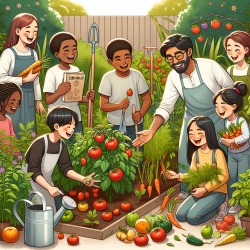Introduction
As a Special Education Director, it is imperative to explore innovative methods that enhance the well-being of students. The research article titled "Exploring the Relationship between School Gardens, Food Literacy and Mental Well-Being in Youth Using Photovoice" offers valuable insights into how school gardens can be leveraged to improve mental health and food literacy among youth. This blog aims to guide practitioners in implementing these findings to foster a supportive learning environment.
The Power of School Gardens
School gardens serve as dynamic educational tools that provide hands-on learning experiences. According to the research, school gardens contribute significantly to students' mental well-being by offering a space for relaxation, connection, and personal growth. These green spaces encourage students to engage in experiential learning, which can enhance their resilience, autonomy, and sense of belonging.
Implementing Food Literacy
Food literacy is an emerging concept that encompasses the skills and knowledge required to make informed food choices. The study highlights how involvement in gardening and cooking activities can develop food literacy competencies among students. Practitioners can incorporate food literacy into the curriculum by organizing activities that involve planting, cultivating, and preparing food. This approach not only promotes healthy eating habits but also empowers students with essential life skills.
Photovoice as a Research Method
The study utilized the photovoice methodology, allowing students to document their experiences through photography and storytelling. This participatory approach enabled students to express their perspectives on food and gardening, fostering a deeper understanding of their mental well-being. Practitioners can adopt similar methodologies to engage students actively in their learning processes, encouraging them to explore and reflect on their experiences.
Building Connections and Community
One of the key findings of the research is the role of school gardens in building connections among students, teachers, and the community. Youth clubs or groups that engage in gardening activities can create a sense of community and belonging, which is crucial for mental health. Practitioners should consider forming such groups to facilitate interactions and relationships, enhancing students' social skills and emotional intelligence.
Encouraging Further Research
While the study provides valuable insights, it also opens avenues for further research. Practitioners are encouraged to explore the long-term impact of school gardens and food literacy on student well-being. Collaborating with researchers and participating in studies can contribute to a deeper understanding of these concepts and their applications in educational settings.
To read the original research paper, please follow this link: Exploring the Relationship between School Gardens, Food Literacy and Mental Well-Being in Youth Using Photovoice.










